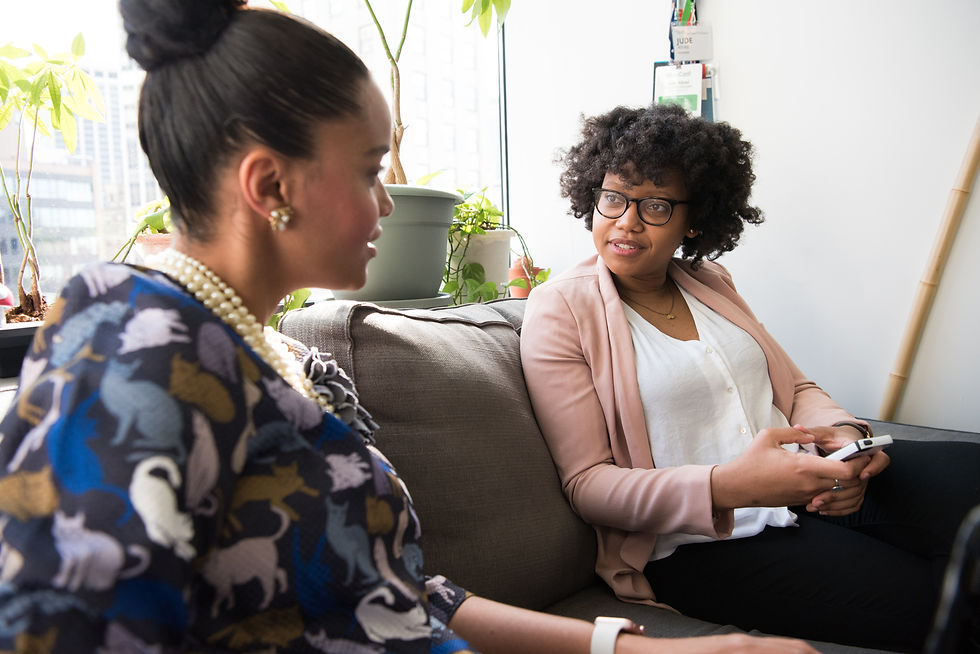The True Value of Clinical Consultation
- Catalyss Counseling

- May 23, 2022
- 3 min read

As a therapist, I am still relatively new to the world of private practice. Several months ago, when the practice manager posed the idea of pursuing clinical consultation, I was only too eager to get started. My primary intention in seeking clinical consultation was to continue developing my counseling skills in order to improve my effectiveness with clients.
Switching from the community mental health setting to a group private practice setting was exciting but I definitely had feelings of intimidation and imposter syndrome, especially as a younger person in the field. Like many new therapists (I imagine), I was attracted to the idea of having a space to gain insights, perspectives and knowledge from a more experienced practitioner, a clinical supervisor.
My Experience in Clinical Supervision
In my time working with a clinical supervisor, I am happy to report that the skills-based aspect of our time together has met all of my expectations. I can go to my supervisor about clients with whom I feel stuck or stumped by, I can flush out ideas surrounding theoretical conceptualizations, and I can count on my supervisor to provide feedback regarding various interventions and treatment approaches.
These are the kinds of issues that initially brought me to clinical consultation, and I am very grateful to have these discussions because I believe they enrich and strengthen my own practice. However, I have been surprised to recognize that the most impactful conversations with my supervisor have not revolved not around my clients, but around me.
My Journey as a Private Practice Therapist
Getting started in private practice, I regarded identifying a target population as paramount to establishing myself as a therapist. When considering the question- pm“What is my specialization?”- potential answers seemed to be styled in the form of clinical issues. Will I see primarily clients with depression, or anxiety, or maybe trauma, or perhaps grief? How can I most effectively become an expert in one of these specializations?

It can be so natural for people in helping professions to focus on other people’s needs and how we believe we can best meet them. For me, I believed that knowing more was the most meaningful way to make a difference for my clients.
Prior to clinical consultation, I had given much less thought by far to what I need as a therapist in order to feel energized and fulfilled by my work. My clinical supervisor encouraged me to more critically examine the moments when I felt best about my role as a therapist. As it turns out, I feel most capable and competent as a clinician not when I am providing expertise to my clients, but when I am cultivating connection with them.
Facilitating effective relationships is something that presumably comes naturally to most therapists, and I admit that I didn’t anticipate that this aspect of clinical work would require much attention in terms of my continued professional development.
Working on Myself in Clinical Consultation
With ongoing prompts from my supervisor, clinical consultation has provided me with a space to develop a greater awareness of personal responses to my work. Being more mindful of my own values and experiences has provided me increased insight on how to strengthen the therapeutic alliance with my clients.
The end result has been more moments of closeness that feel so meaningful and powerful to me as a clinician. Redirecting my attention from the content of my sessions to the process of my therapeutic relationships has not only broadened my perception of what effective helping looks like, but also created more helpful (and achievable!) expectations for myself as a therapist.
The True Value of Clinical Consultation
Through clinical consultation I have been able to achieve more joy and satisfaction in my work. As a therapist in training, you are always told “the therapeutic relationship is the most

important thing,” but this statement always just felt like somewhat of a platitude to me. Working with my clinical supervisor has allowed me to connect with this message in a way I couldn’t fully appreciate before my time in consultation. All in all, clinical consultation has helped me toward my initial goal of improving therapeutic outcomes- just not in the way that I was expecting.
INTERESTED IN CLINICAL SUPERVISION?
If you are interested in developing a relationship with one of our clinical supervisors through ongoing individual clinical consultation, Schedule a Free 20-Minute Phone Consultation with one of our supervisors.
We help therapists throughout Colorado further their professional growth and connect with others who are as passionate about this work as you are.
Author Biography

Dylan Mackie Hernandez specializes in treating those who are more analytical in their thinking patterns, and tend to be highly logical, intelligent, and high-achieving. She believes that change is most sustainable when treatment is tailored to maximize confidence and autonomy both in and out of therapy sessions. Follow Catalyss Counseling on LinkedIn, Facebook and Instagram.





Comments